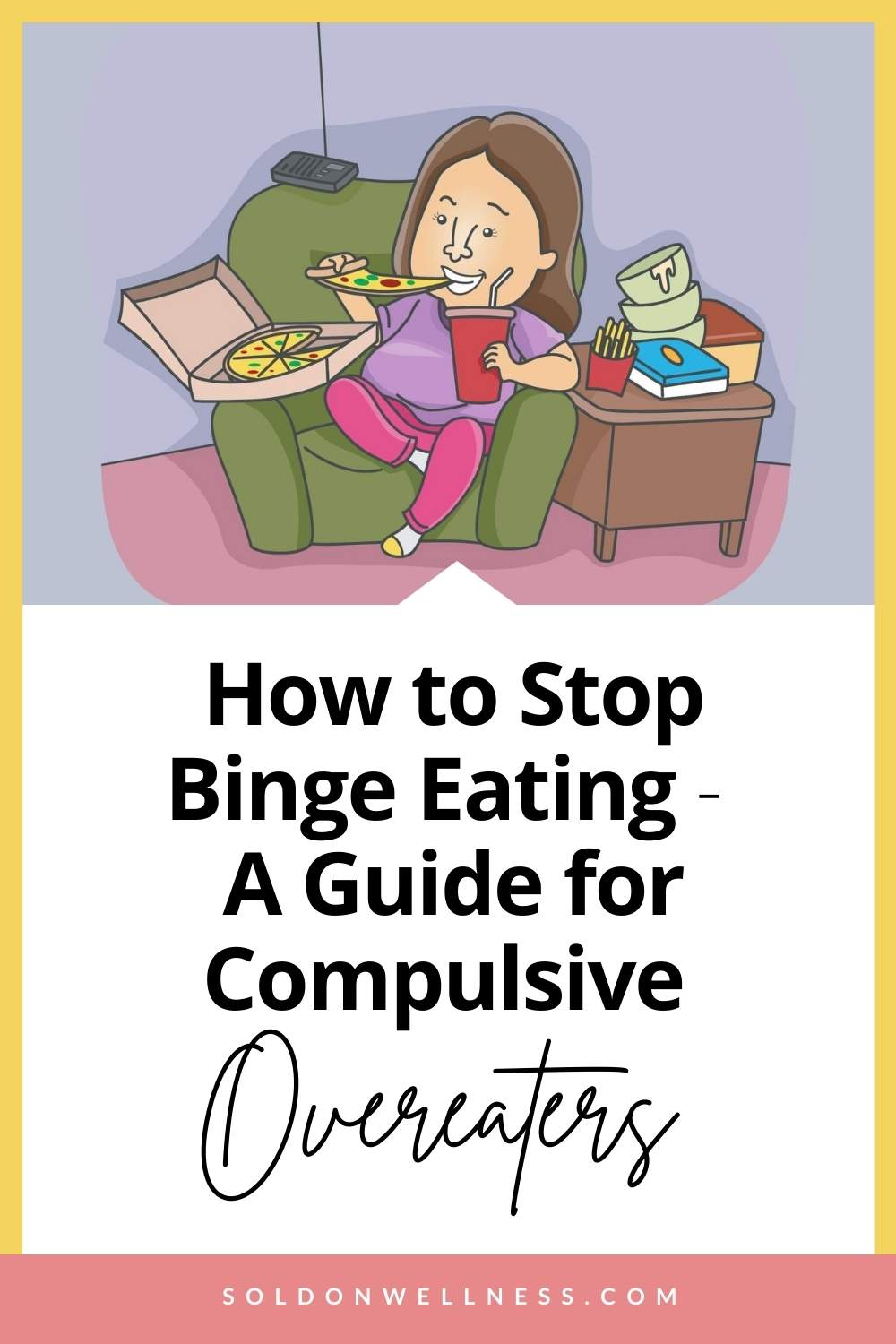How to stop binge eating usually begins with understanding how you can stop yourself from overeating.
To stop binge eating, it is important to understand your patterns of behaviour and how this may lead to compulsive overeating in the first place.
Breaking your binge eating down into manageable chunks will make it easier to tackle them one by one, which can help you break the cycle of compulsive overeating and start living a healthier lifestyle.
Binge eating is an addiction that many people struggle with. It can be difficult to stop, but you can take steps to help yourself get better and keep binge eating in check.
This blog post will give you tips for how to stop binge eating so that you can live a healthier life!
What is binge eating?

Binge eating is the act of overeating at a rapid rate. This behaviour can also be known as "gorging" or "stuffing". As individuals who binge eat, they will often consume large quantities of food in one sitting and then feel guilty about how much was consumed afterwards.
Individuals with this disorder may experience many emotional and physical consequences as a result of bingeing on food. These consequences may include guilt, shame, embarrassment and weight gain.
They will often experience headaches, stomach aches or heartburn after eating excessively fast and a feeling of heaviness in their stomach.
Binge eating can also lead to a decreased sense of self-esteem and how they feel about themselves overall, which will, in turn, cause the individual to experience depression or anxiety.
These feelings may be overwhelming for someone who binge eats on food due to how their emotions are regulated through this method.
In addition, individuals with this disorder may find themselves fatigued and exhausted. This is because bingeing on food causes the body to use up extra energy for its everyday functions, such as digestion or proper brain function.
Binge-eating triggers
Binge eating triggers are usually based on how individuals feel about themselves and how they cope with emotions in general. The triggers for how to stop binge eating will differ from person to person, but there are a few commonalities that can be found in how people cope with their emotions.
Some common triggers are:
- Stressful situations: Binge-eating is a way to cope with emotional distress.
- Mood: Binging can be used as an escape when feeling upset, angry or stressed.
- Certain foods: People who binge often have certain trigger foods that send them into binges and make it hard for them to control how much they eat. These are usually high-calorie foods like pizza, ice cream or cake.
- Boredom: Eating is a way to keep oneself entertained and fill the time when things get dull.
- Depression: Whether one is clinically depressed or not, the feelings of hopelessness and worthlessness that come with depression can lead to binges.
- Anxiety: Feelings of anxiety may also lead to binge eating
- Feeling full after eating a small amount of food
- Social gatherings where overeating is encouraged. (Festive occasions) -If you know what your triggers are, avoid them as much as possible. If this isn't feasible for any reason, be prepared by carrying healthier alternatives with you, like a piece of fruit or low-sugar cereal bars.
- Others: People also use binges as a form of self-punishment for not sticking with their diet as well as an excuse so that they don't have to deal with how they're feeling.
Binge eating disorder is not triggered by a lack of self-control but rather the inability to regulate emotions with other coping mechanisms.

Ways to help yourself if you're struggling with bingeing
- There are many ways that you can help yourself if you are struggling with binge eating. One of the most effective and reliable ways to stop overeating is cutting out sugar, alcohol, and carbs from your diet, as this will reduce cravings for those things and help curb how much weight you gain.
- You can also try taking supplements like Holy Basil or serotonin-boosting medications to improve how your body manages stress hormones, which may impact how often you binge eat.
- You can also try talking to a nutritionist or therapist, and they may be able to help you with how much time is spent binge eating as well. If the problem persists, it could lead to addiction, so speak up sooner rather than later!
- Stay away from people who trigger overeating behaviour.
How to stop binge eating

1. Individuals who struggle with how they feel about their emotions will need help to regulate how they are feeling and how they cope.
This can be done by seeking therapy from a professional who will help them recognise how their emotions cause bingeing on food and how to deal with these difficult feelings in other ways besides turning to food for temporary relief.
2. Another way that individuals may stop binging is through using good coping mechanisms when dealing with how they feel.
This may involve self-soothing, journaling or listening to music to help individuals avoid turning to food for how they feel.
Other tips that can be helpful are using a diet plan with eating prearranged meals on specific days and practising mindful eating by taking small portions of food into their mouth one at a time.
Treatment for binge eating disorder (BED)
- Get psychological treatment if you have been diagnosed with binge eating disorder (BED) as part of a comprehensive treatment program.
- Cognitive behavioural therapy is often used to treat BED. The goal of cognitive-behavioural therapy for BED is not weight loss but rather changing how people think about food and how they eat to change their behaviours.
- You may also be given an anti-depressant medication if you have BED and depression or anxiety. These medications can help reduce how often people with binge eating disorder (BED) feel the need to overeat, how much they eat when they do overeat, and how out of control their feelings get after overeating.
- Eat breakfast and have small, healthy snacks in between meals low in calories to reduce how often you feel the need to overeat because your stomach is empty.
- Get regular physical activity, so it's easier for you not to overeat when you're feeling stressed or depressed, which can trigger binge-eating episodes. If you do overeat and you have a binge eating disorder (BED), try to get back on track with your diet the next day.
- Get enough sleep each night, which is important for how much control we feel over how much we eat at a meal or how often we overeat.
- Learn how to deal with stress in other ways besides eating.
- Get involved in binge-free social activities to distract yourself from how you feel when you are feeling stressed, bored, and anxious about how much you eat.
If none of these strategies works for managing your binge eating disorder (BED), talk with your healthcare provider about getting an evaluation at a specialized centre that provides treatment for binge eating disorder (BED).
Final thought on how to stop binge eating

If you or someone in your life suffers from a binge eating disorder, please reach out to a doctor for help.
This article has given some useful information about the consequences of this condition and how it can be treated professionally.
We hope that we’ve provided some helpful insight into what causes people to engage in these challenging behaviour patterns and offer an avenue back towards healthy living through medical intervention.
Have any thoughts on this topic? Let us know by dropping your comments below!




